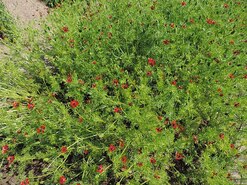Jemma Batten, Black Sheep Countryside Management -Managing for wildlife on the Salisbury Plain21/10/2021
Jemma Batten gave the talk which had been postponed from September. She explained how she was invited to work as a consultant by the Defence Estates Licensees and Tenants Association (DELTA). These tenant farmers of the MoD-owned Salisbury Plain have set up Plain Conservation https://plainconservation.co.uk/ to work together “to enhance habitats, and protect wildlife, historic and landscape features, water and soils.”  Pheasant's eye -Adonis annua. © Krzysztof Ziarnek, Wiki Commons Pheasant's eye -Adonis annua. © Krzysztof Ziarnek, Wiki Commons Jemma advises on how to deliver the key conservation objectives from the detailed plans drawn up by all the stakeholders. We saw examples on-screen of all the various mapping layers of Salisbury Plain. Areas are graded from low to high priority for land management reasons or the encouragement of native flora and wildlife. We were fascinated to see that there were also Super Plans which drilled down to field level detail where named plants such as horseshoe vetch and bastard toadflax on chalk downland and pheasant’s eye on arable fields were protected by sensitive management and where the wildflower field margins would stretch to 30 metres in places. Fertilisers are no longer used and wilding practices of leaving mown areas for seed dropping have helped contribute to the increased appearance of Britain’s rarest butterflies like the marsh fritillary, adonis blue and brown hairstreak and the shrill carder bee, Britain’s rarest bumblebee. Birds such as the bittern, hen harrier and stone curlew are also being seen more widely as the marsh and grasslands improve in quality.
We learnt that staying on top of the fast-growing scrub needs to be actioned every two months, either by tractor or by mob grazing cattle. Grazing areas are marked out by erecting temporary electric fences that need moving every 2-3 days. A time-consuming task, so some farmers set up virtual fences and use radio activated collars on the cattle which bleep when they are within feet of a virtual fence and then administer a mild electric shock if they cross over the “line”. The cows soon learn! Being a military zone, not only are there pockets of dangerous or simply inaccessible places on Salisbury Plain, but farmers also have to respond immediately to commands to move their herds, often with zero notice. We expressed awe in the face of what is obviously a complicated and heavily monitored way of farming on Salisbury Plain. There is no doubt that these chalk grasslands have benefited from the strict measures put in place over the last 20 years to bring a healthier bio-diversity to an area that, though never having had artificial fertilisers or pesticides, has in the past been neglected. The passion for conservation runs deep with these farmers, so take a look at their DELTA website to learn more about their work https://plainconservation.co.uk/ Please refer to the Gov.UK website for guidance about the public access of Salisbury Plain and always ring 01980 674763 before a visit. An answer phone recording gives up to date information on areas open for public access. https://www.gov.uk/guidance/public-access-to-military-areas#salisbury-plain Comments are closed.
|
Photo: Avocets (Izzy Fry)
The headers display photos taken by our members. Do get in touch via the Contact Form if you'd like to submit a photo for selection.
Archives
May 2024
Categories
All
|

 RSS Feed
RSS Feed